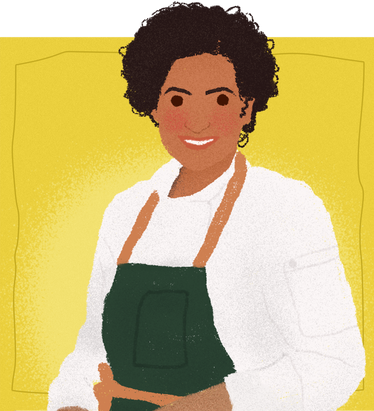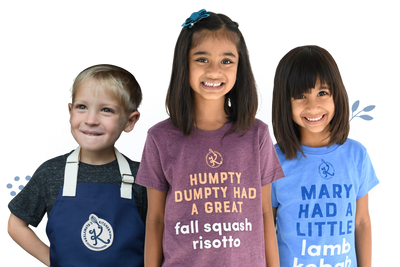
Taste Bud Profile
Reem Assil

Chef Reem Assil sees food as a way to build community, a vision that was influenced by her Arab culture, her family, her life in the US, and by her time as a community and labor organizer. One of her proudest moments as a parent, her young son wanting to share his food with her, is something she believes in strongly as an educational tool for all of us: "We all have something to give. Find a way to give it. The act of sharing can be transformative in your life."



Reem Assil: I have a life story that can’t be put into a box. I’m the child of Palestinian and Syrian immigrants. My parents met in Beirut during the Civil War. My mother was a refugee in Lebanon. My grandparents had been displaced a couple of times because of the incursion in Palestine. My parents first moved to Lancaster, where my mom recalls the first food she was introduced to—a peanut butter and jelly sandwich. They eventually moved to a little suburb of Boston, which is where I was born. My life was a melding of a very strong Arab identity with Americana. My mother studied and worked, so we were latchkey kids. We wanted to belong, to be part of American life, but my parents wanted us to maintain our Arab identities.
My mom would throw together meals that snuck in Arab flavors to American foods—like Kofta spaghetti and meatballs, or tomato sauce with seven spice. Those are my earliest food memories—the quick, thrown-together mashups that were not Arab and not American but something of both.
I also have very distinct memories of my grandmother. She was the nexus of our diasporic family. After the war, my grandparents did not want to stay in Lebanon, so they moved to Greece, and eventually settled in California. Every summer we visited them, and everything was centered around her kitchen. When I think of memories around food—like food you’d get in the homeland—I think of those summer trips to California. We’d get off the plane just in time for the midday meal, which for Arabs is the main meal of the day. She’d make these elaborate spreads, like Cornish hens stuffed with turmeric rice and ground beef or lamb, big platters of grape leaves with lamb tongues, mezze platters with hummus, salads, tabbouleh. My grandfather would grill skewers that my grandmother had marinated in the morning. She also did elaborate breakfasts for us. I have something on my menu called Tayta’s breakfast, where we do a perfect 6 minute egg with za’atar and olive oil, which I do in her honor. She spent all of her time in the kitchen, which I swore I’d never do—ironic that I ended up being the chef in the family.

Food is transformative from both sides. When you are fed, you are feeding. When you are feeding, you are fed.
I understand now why my grandmother spent so much time cooking. I was hard on her for being home all the time, but eventually I realized we were feeding her by letting her feed us. My grandparents both passed away within the last 18 months, which has been really hard. My mother, now the matriarch of the family, actually bought their house in California. She needs to modernize it, but we don’t want her to do things like change the cabinets, because in my mind, the wood is seeped with the scents of my grandmother—seven spice, allspice, cumin, coriander—and I can’t bear the thought of losing that.
I was hyper aware of my identity when I was younger. I think it’s because I was always aware that people shied away from the word Arab, as though it were a bad word.
I grew up during the Gulf war, and September 11th happened during my first week of college. Food was the universal language that my mom used to sweep in and help me feel better about who I was. I remember running home from school crying because we’d had to watch some awful stereotypical cultural tutorial from the 70s about how Arabs burped at the dinner table, and all the kids laughed at me. Whenever anything like that happened, my mom always stormed into the school to advocate for us. Whenever we fasted for Ramadan, nobody understood that. She tried to get us to focus on the things we got to do because of Ramadan, not the things we didn’t. She would make traditional sweets and bring them to school for the other kids as a way to say that we have fun, delicious things about our culture, and that they should learn about them. In that way food bridged the gap between me and other kids. It broke down some of the barriers that the world had put up for them around people like me.
It’s so complicated being a child or a parent in this country. There is such a vast representation of cultures, but often culture is appropriated, diluted, usurped, and taken—when in reality we should be finding ways to share it, and be open to receiving it.
I spent over 10 years as a community and labor organizer, fighting for people to have a voice in their neighborhoods and in their jobs. That was my way of building community. That kind of work so often takes, but doesn’t replenish you. When you are constantly advocating against institutionalized wrongs, you have to find a way to sustain yourself. I looked at the communities I was working in and I saw that they were depleted in so many ways. I also saw my own impending burnout. So I took a trip to Syria and Lebanon with my father. I can’t say that I came completely full circle on my relationship with my own identity, but I did return with a renewed faith and understanding in just how powerful and resilient my people are. The way that I really was able to appreciate this resilience was in the food spaces—women cooking on the side of the street, inviting me to learn how they make their bread. When you’re immersed in real life, you’d never guess that there was such political turmoil happening. I had an epiphany moment, which was that I could find a way to show this side to the American people—we’re not just the terrorist, or the refugee. The Arab culture is inherently hospitable. In fact, hospitality is explicitly a key virtue. We use food as a way to show hospitality, and build community. I thought about how Arabs have done this for generations upon generations, bringing people in from the desert and showing them sustenance and community as a means of survival. You take care of everyone. I missed that virtue. That was my second epiphany—that in all my time organizing, the communities in which I was working were missing those kinds of spaces. Spaces where people could feel alive and taken care of, spaces to be themselves and to organize for change. Revolutions are started in cafes! I decided to become a baker, so that I could build this space: an Arab street corner bakery, or a very simple version of one anyway. I worked in the industry for 7 years before I opened Reem’s.
We all have something to give. Find a way to give it. Sharing, and especially through food, builds community. The act of sharing can be transformative in your life.
One of the things that makes me most proud as a parent is that my son loves sharing his food with me. If he eats anything, he will offer it to me as well. That act of sharing is really his empathy starting to form, and it is going to carry on in to other parts of his life. I think he will be a very connected person. You don’t feel alone when you share—you feel fulfilled and happy because people will also be open to share with you. When you give, you will receive.

